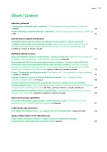Type 2 diabetes mellitus and chronic kidney disease
Authors:
Peter Ponťuch
Authors‘ workplace:
IV. interná klinika LF UK a UNB, Nemocnica sv. Cyrila a Metoda, Bratislava, Slovenská republika
Published in:
Vnitř Lék 2017; 63(3): 188-192
Category:
Reviews
Overview
The number of type 2 diabetic patients is increasing world-wide and a prediction of prevalence of chronic kidney disease up to 2025 in European diabetic population is alarming. Albuminuria and estimated glomerular filtration rate are cardinal biochemical parameters in diagnostics of diabetic nephropathy. Following diagnostic methods are also used: renal ultrasonography, ophthalmoscopy and in not clarified cases renal biopsy. Long-term optimal glycemic control, efficient antihypertensive treatment by angiotensin converting enzyme inhibitor, or angiotensin receptor blocker and recommended protein intake is a cornerstone of therapy. The research is presently focused on new pathophysiological mechanisms, as analysis of genome, microRNA, kidney injury biomarkers and proteomes.
Key words:
chronic kidney disease – type 2 diabetes mellitus
Sources
1. Martinka E, Ponťuch P, Mišániková M et al. Výskyt diabetickej nefropatie v populácii pacientov s diabetes mellitus na Slovensku: výsledky prieskumu NEFRITI. Forum Diab 2015; 4(3): 198–207.
2. Kainz A, Hronsky M, Stel VS et al. Prediction of prevalence of chronic kidney disease in diabetic patients in countries of the European Union up to 2025. Nephrol Dial Transplant 2015; Suppl 4: iv113-iv118.
3. de Boer IH, Rue TC, Cleary PA et al. Long-term renal outcomes of patients with type 1 diabetes and microalbuminuria: an analysis of the DCCT/EDIC cohort. Arch Intern Med 2011; 171(5): 412–420.
4. Kropelin TF, de Zeeuw D, Holtkamp FA et al. Individual long-term albuminuria exposure during angiotensin receptor blocker therapy is the optimal predictor of renal outcome. Nephrol Dial Transplant 2016; 31(9): 1471–1477.
5. Titze S, Schmid M, Köttgen A et al. Disease burden and risk profile in referred patients with moderate chronic kidney disease: composition of the German Chronic Kidney Disease (GCKD) cohort. Nephrol Dial Transplant 2015; 30(3): 441–451.
6. Okša A, Demeš M, Daniš D. Nefropatie u diabetikov v renálnych biopsiách 2000–2015: In: 38. kongres Slovenskej nefrologickej spoločnosti, Bratislava 2016. Zborník abstraktov: 21.
7. American Diabetes Association. Standards of medical care in diabetes – 2017. Microvascular complications and footcare. Diabetes Care 2017; 40(Suppl 1): S88-S98.
8. Holman RR, Paul SK, Bethel M et al. 10-year follow-up of intensive glucose control in type 2 diabetes. N Engl J Med 2008; 359(15): 1577–1589.
9. Zinman B, Wanner C, Lachin JM et al. for the EMPA-REG OUTCOME investigators. Empagliflozin, cardiovascular outcomes and mortality in type 2 diabetes. N Engl J Med 2015; 373(22): 2117–2128.
10. Wanner C, Inzucchi SE, Lachin JM et al (for the EMPA-REG OUTCOME investigators). Empagliflozin and progression of kidney disease in type 2 diabetes. N Engl J Med 2016; 375(4): 323–334.
11. Martinka E, Uličiansky V, Mokáň M et al. Konsenzuálny terapeutický algoritmus pre diabetes mellitus 2. typu. Diabetes a obezita 2016; 16 : 9–23.
12. European Renal Best Practice. Clinical practice guidelines on management of patients with diabetes and chronic kidney disease stage 3b or higher (eGFR < 45 ml/min). Nephrol Dial Transplant 2015; 30(Suppl 2): ii1-ii46.
13. Regele F, Jelencsics K, Shiffman D et al. Genome-wide studies to identify risk factors for kidney disease with a focus on patients with diabetes. Nephrol Dial Transplant 2015; 30(Suppl 4): iv26-iv34.
14. Rudnicki M, Beckers A, Neuwirt H et al. RNA expression signatures and posttranscriptional regulation in diabetic nephropathy. Nephrol Dial Transplant 2015; 30(Suppl 4): iv35-iv42.
15. Mischak H, Delles C, Klein J et al. Urinary proteomics based on capillary electrophoresis coupled mass spectrometry in kidney disease: discovery and validation of biomarkers and clinical application. Adv Chronic Kidney Dis 2010; 17(6): 493–506.
16. Linhardt M, Persson F, Currie G et al. Proteomic prediction and renin angiotensin aldosterone system inhibition prevention of early diabetic nephropathy in type 2 diabetic patients with normoalbuminuria (PRIORITY): essential study design and rationale of randomised clinical multicentre trial. BMJ Open 2016; 6(3): e010310. Dostupné z DOI: <http:// doi 10.1136/bmjopen-2015–010310>.
17. Pena MJ, Mischak H, Heerspink HJL et al. Proteomics for prediction of disease progression and response to therapy in diabetic kidney disease. Diabetologia 2016; 59(9): 1819–1831.
Labels
Diabetology Endocrinology Internal medicineArticle was published in
Internal Medicine

2017 Issue 3
-
All articles in this issue
- Effectiveness of education in diabetes care management – instructions for educators
- Irregular breathing during the cardiopulmonary exercise test – from mildly irregular breathing pattern to periodic breathing of oscillatory ventilation type
- Contribution of CT colonography to clinical practice
- Type 2 diabetes mellitus and chronic kidney disease
-
Význam zobrazení srdce pomocí magnetické rezonance v diagnostice hypertrofické kardiomyopatie
Část I - Cardiovascular complications of cancers and anti-cancer therapy
- Comments on current guidelines of type 2 diabetes mellitus treatment
- Radiofrequency catheter ablation of atrial fibrillation performed under general anesthesia: results of a unicentric randomized trial
- Internal Medicine
- Journal archive
- Current issue
- Online only
- About the journal
Most read in this issue
- Contribution of CT colonography to clinical practice
- Effectiveness of education in diabetes care management – instructions for educators
- Radiofrequency catheter ablation of atrial fibrillation performed under general anesthesia: results of a unicentric randomized trial
- Irregular breathing during the cardiopulmonary exercise test – from mildly irregular breathing pattern to periodic breathing of oscillatory ventilation type
